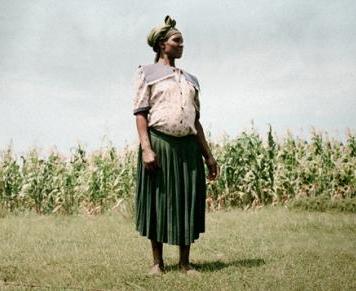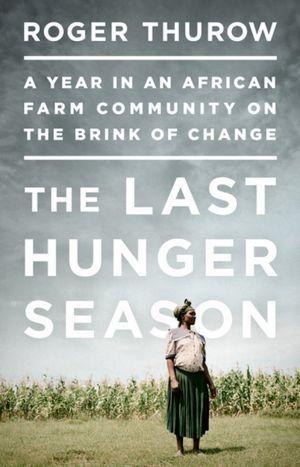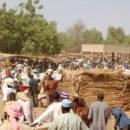The Last Hunger Season: a fine but flawed study of poverty in rural Kenya – Review by Magnus Taylor

 Reporting Africa is too often a game of big politics: elections, coups, terrorists, oil deals and Julius Malema. You can easily be an expert of all these things by reading everything available online, but as well-informed as this may make you, you still won’t have the faintest idea what it’s actually like to live the life of a person who lives there. This, however, is the great strength of Roger Thurow’s new book: The Last Hunger Season: a year in an African farm community on the brink of change. It also happens to be its weakness. Here’s why.
Reporting Africa is too often a game of big politics: elections, coups, terrorists, oil deals and Julius Malema. You can easily be an expert of all these things by reading everything available online, but as well-informed as this may make you, you still won’t have the faintest idea what it’s actually like to live the life of a person who lives there. This, however, is the great strength of Roger Thurow’s new book: The Last Hunger Season: a year in an African farm community on the brink of change. It also happens to be its weakness. Here’s why.
Roger Thurow cares about Western Kenya. In authoring The Last Hunger Season, he spent enough time in the region to really know what living there is like. Thurow sought to write a book that followed the fortunes of 4 small-holder farmers as they negotiated the challenges another year brought them, eking out a living from the land. But he also wanted to make some bigger points about how we can combat poverty and hunger in such communities.
Thurow is a refreshingly old-school reporter, so doesn’t feel the need to insert himself in to every scene – telling us all how everything made him feel. But he must have been a quiet and intelligent presence, taking in the struggles and choices his “˜protagonists’ encountered as they strove to grow enough food to live on, make enough money to send their children to school, buy rudimentary medicines to treat malaria and afford a few basic luxuries such as the odd chicken for Christmas dinner.
Accordingly, the book becomes a close study, a paean even, to “˜the African farmer’ – or more specifically to his 4 – all living near to the town of Bungoma in Western Kenya. Bungoma is most definitely not Nairobi – a city in which you can eat fine Italian food and mix with the development glitterati and gurus of poverty eradication.
The heroine of the book is the most memorable of Thurow’s 4 – Leonida Wanyama – and at times it reads like a platonic love letter to her determination and will to succeed. Leonida struggles to make small but crucial economic decisions – to buy or sell a portion of her harvest or to keep her bright and ambitious son Gideon in school; not just because education is a good thing in itself, but because the high-earning potential he will have should he become educated and employed will ensure there is a wealthy family member to look after her in old age.
The other “˜hero’ – if such a word is really appropriate – is Andrew Youn, the American founder of the One Acre Fund. This is an innovative NGO which sees the best way of lifting subsistence farmers out of poverty and chronic food insecurity in rural Africa (specifically Kenya) is to sign them up for micro credit from the One Acre bank, enabling them to purchase key inputs from which they can greatly increase their agricultural yields. Each of the 4 farmers has signed up to One Acre’s scheme.
Simple additions to farming practises, such as fertiliser, hybrid seeds and technical instruction on how to use them effectively, can revolutionise how poor families survive. Thurow compares current rural farming practises in Western Kenya to those used in most of Asia prior to the “˜Green Revolution’, which came on the back of American agronomist and Nobel Prize winner Norman Borlaug’s development of high-yield, disease resistant varieties of wheat. As Thurow states in Enough, his earlier bestseller on global food insecurity: “Since the time of the Green revolution, the world has known how to end famine and tame chronic hunger. We have the information and tools, but we haven’t done it.”
Andrew Youn is an inspiring figure – a man who “[does] his heavy lifting with numbers” and who brings the ambition and economic liberalism of his pre-One Acre, private sector days to a task of a much larger scale – solving hunger one farm at a time. Merely giving food aid to farmers who can’t currently grow enough is “terribly uncreative” says Youn, and you would have to agree.
However, whilst One Acre’s work is laudable and extremely impressive in the particular examples we see, it is by no means universally accepted that enabling subsistence farmers to grow more food is the way to really beat poverty in rural Africa. The developmental economist Paul Collier, in his review in the Washington Post, argues that “Africa’s future is not as a continent of happy peasants” pointing to the successful Brazilian model – highly mechanized production and greater urbanization is the answer, enabling the children of smallholder farmers to move off the land.
I was, additionally, disappointed by the paucity of references to Kenyan national politics as major cause of continued stagnation in agricultural production. Leonida, at one point, exasperatedly comments that “In Kenya there is no free education. That was just election promises…the government won’t change the time when school fees are due” – an important point no doubt, but Thurow might have found space to examine the lack of democratic accountability Kenya’s political leaders feel to their predominantly rural populations. Or the absence of mechanisms or organisations to communicate grievances of this nature to decision-makers in Nairobi.
Leonida Wanyama’s story may inspire as a tale of (local) success in the face of adversity and the overseas aid budget cutting tendencies of US congress, but it is not necessarily the future or the answer. Roger Thurow has however written a sensitive and highly revealing book on the day-to-day meaning of rural poverty in African countries.
Magnus Taylor is Managing Editor, African Arguments Online.






[…] Reporting Africa is too often a game of big politics: elections, coups, terrorists, oil deals and Julius Malema. You can easily be an expert of all these things by reading everything available online, but as well-informed as this may make […]
I would like to read this book hope i ca get it on Amazon. As a Kenyan i feel that it still is morally wrong for the government of Kenya to not give agricultural sector the much needed attention. Rural development despite it’s huge potential of providing food security to millions of Kenyans has and continues to be neglected. It is a shame that the people who are feeding the country are still the “hungry” ones.
[…] of goals, and the followup of the lives of several people mentioned in a related book (see https://africanarguments.org/2012/11/26/the-last-hunger-season-a-fine-but-flawed-study-of-poverty-in-… for a review). Share this:TwitterFacebookLike this:LikeBe the first to like […]